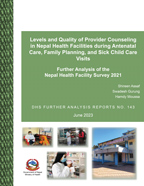There is no printed copy available to order.
Abstract:
This report examines the levels and quality
of counseling provided in the health
facilities of Nepal. Providers during
antenatal care, family planning, or sick
child care consultations were observed for
providing specific counseling to their
clients. The clients were then asked in the
exit interview if they received this
counseling. The agreement between observation
and the client’s report is an indicator of
the quality of the counseling that was
provided. In general, there were low levels
of counseling provided and lower levels of
agreement that the counseling had occurred.
With antenatal care, the lowest levels of
counseling were related to the side effects
of iron pills, breastfeeding, and use of
family planning after delivery. For family
planning, the lowest level of counseling was
a method’s protection from sexually
transmitted infections, while for sick child
care the lowest level was the weight and
growth of the child. For other counseling
items that were observed at higher levels,
the agreement that the counseling had
occurred was lower, which might indicate that
the counseling provided was not effective.
The observed counseling and agreement on
counseling with the client’s report differed
by client, provider, and facility
characteristics. For example, counseling on
danger signs was more likely to be given to
clients who have higher education or who had
more than one visit. Nurses and midwives were
found to provide more counseling and have
higher agreement on counseling than other
provider types. Providers’ training, when
significant, was found to also increase the
observation of counseling and the agreement
on counseling provision. The importance of
counseling was related to the client’s
knowledge of danger signs, ways to prepare
for delivery, and a
method’s protection from sexually transmitted
infections. In general, counseling and the
agreement that the counseling had occurred
increased the likelihood of having knowledge
compared to the clients who did not
receive the counseling. These findings
highlight areas of intervention that can
improve the levels and quality of counseling.
These include training specific providers in
client-centered counseling and ensuring that
effective, high-quality counseling is
provided to all clients at each visit.
 Levels and Quality of Provider Counseling in Nepal Health Facilities during Antenatal Care, Family Planning, and Sick Child Care Visits (PDF, 2162K)
Levels and Quality of Provider Counseling in Nepal Health Facilities during Antenatal Care, Family Planning, and Sick Child Care Visits (PDF, 2162K)
